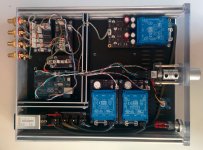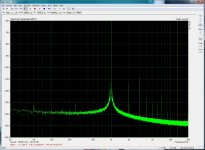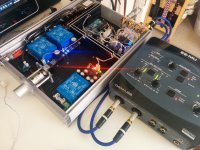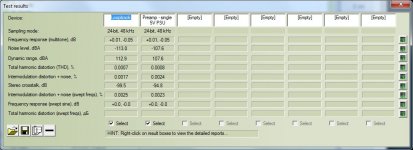Turn up the soldering tip temp to 400°C
Heat the solid ground and tin the area for the connection.
While it is still hot attach the generously tinned ground lead and job done.
Remember to turn the tip temp back down to 280 to 300°C for the "hot" connection.
Heat the solid ground and tin the area for the connection.
While it is still hot attach the generously tinned ground lead and job done.
Remember to turn the tip temp back down to 280 to 300°C for the "hot" connection.
I had it on 470.Turn up the soldering tip temp to 400°C
Like this:What do those female RCA connectors look like from the business end?
I fitted a copper link across both legs of the Signal return.
The cable Return wire connected to the centre of that link.
This connection point is VERY CLOSE to the Signal Flow connection to the centre Pin, to minimise LOOP AREA.
The TWO LOOPS in the final connections to the two legs create nearly equal and opposite phase for minimising the impinging interference.
The cable Return wire connected to the centre of that link.
This connection point is VERY CLOSE to the Signal Flow connection to the centre Pin, to minimise LOOP AREA.
The TWO LOOPS in the final connections to the two legs create nearly equal and opposite phase for minimising the impinging interference.
Hi Maxw,
Looking great!
Is it completely up and running?
You're completely free of distortion now?
BTW,
I've included some pics of a heatsink that i made just a few days ago. It should give a bit of an impression of the case that i'm going to make later on.
Regards,
Peter
Looking great!
Is it completely up and running?
You're completely free of distortion now?
BTW,
I've included some pics of a heatsink that i made just a few days ago. It should give a bit of an impression of the case that i'm going to make later on.
Regards,
Peter
Attachments
-
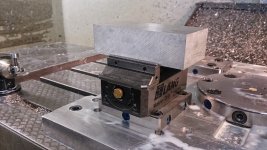 DSC_0958.JPG155.1 KB · Views: 1,293
DSC_0958.JPG155.1 KB · Views: 1,293 -
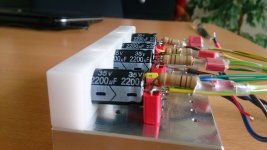 DSC_1026.JPG95.9 KB · Views: 654
DSC_1026.JPG95.9 KB · Views: 654 -
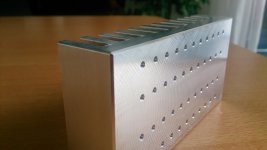 DSC_0974.JPG72.3 KB · Views: 461
DSC_0974.JPG72.3 KB · Views: 461 -
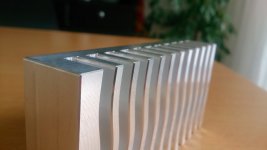 DSC_0973.JPG55.4 KB · Views: 451
DSC_0973.JPG55.4 KB · Views: 451 -
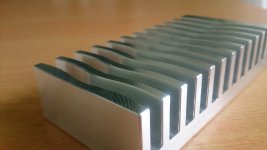 DSC_0970.JPG61.1 KB · Views: 449
DSC_0970.JPG61.1 KB · Views: 449 -
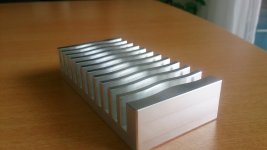 DSC_0967.JPG69.8 KB · Views: 513
DSC_0967.JPG69.8 KB · Views: 513 -
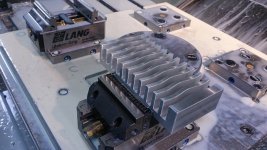 DSC_0965.JPG142.5 KB · Views: 1,174
DSC_0965.JPG142.5 KB · Views: 1,174 -
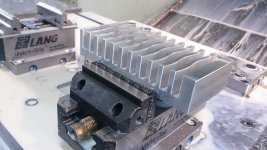 DSC_0963.JPG116.7 KB · Views: 1,180
DSC_0963.JPG116.7 KB · Views: 1,180 -
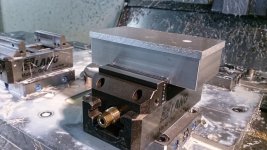 DSC_0962.JPG142.9 KB · Views: 1,182
DSC_0962.JPG142.9 KB · Views: 1,182 -
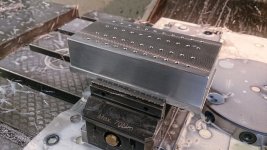 DSC_0961.JPG143.5 KB · Views: 1,238
DSC_0961.JPG143.5 KB · Views: 1,238
Hi Maxw,
Looking great!
Is it completely up and running?
You're completely free of distortion now?
BTW,
I've included some pics of a heatsink that i made just a few days ago. It should give a bit of an impression of the case that i'm going to make later on.
Regards,
Peter
Those pics are amazing!! You must have access to some nice CNC machines.......want to make me something??? 😀
Max,
you seem to have your e-mu working pretty well.
Are those balanced in/outs?
The 0.00064% distortion looks good as well (-103.9dB)
Does the THD+N include the HF noise?
It seems high @ 0.0017% (-95.4dB).
you seem to have your e-mu working pretty well.
Are those balanced in/outs?
The 0.00064% distortion looks good as well (-103.9dB)
Does the THD+N include the HF noise?
It seems high @ 0.0017% (-95.4dB).
Looks great and appears to be performing very nicely! I've not been able to measure so cleanly with my internal soundcard, Asus Xonar D1. Seems as though you've comfortably met your design goals here 🙂
Those pics are amazing!! You must have access to some nice CNC machines.......want to make me something??? 😀
Hi Max,
Yes, i have access to some nice machines, and yes, if you need something feel free to ask. Just send me a PM, i'd be mode than happy to help you (or anyone else) out.
Nope, single ended.Max,
you seem to have your e-mu working pretty well.
Are those balanced in/outs?
This is the limit of the E-MU 0404, I can't measure lower than this via loopback.The 0.00064% distortion looks good as well (-103.9dB)
Loopback gives me about 0.0013% so given that my MDAC attenuator has a gain of 3x (9.5dB) could I really do any better than 0.0017%?Does the THD+N include the HF noise?
It seems high @ 0.0017% (-95.4dB).
Yes. Thanks!Looks great and appears to be performing very nicely! I've not been able to measure so cleanly with my internal soundcard, Asus Xonar D1. Seems as though you've comfortably met your design goals here 🙂
I will 🙂Yes, i have access to some nice machines, and yes, if you need something feel free to ask. Just send me a PM, i'd be mode than happy to help you (or anyone else) out.
Had a look at the spec.
113dB SN ratio
101dB THD+N ratio
the inputs/outputs are dual standard XLR/TRS sockets.
The outputs are specified as balanced.
I can't see a balanced reference for the inputs, but they are both microphone and line and spdif and aes/ebu. This seems to indicate that the inputs are also balanced.
Can you try using bal in/out to see if the loop back results improve?
Are you using win XP, or a later OS?
113dB SN ratio
101dB THD+N ratio
the inputs/outputs are dual standard XLR/TRS sockets.
The outputs are specified as balanced.
I can't see a balanced reference for the inputs, but they are both microphone and line and spdif and aes/ebu. This seems to indicate that the inputs are also balanced.
Can you try using bal in/out to see if the loop back results improve?
Are you using win XP, or a later OS?
Had a look at the spec.
113dB SN ratio
101dB THD+N ratio
the inputs/outputs are dual standard XLR/TRS sockets.
The outputs are specified as balanced.
I can't see a balanced reference for the inputs, but they are both microphone and line and spdif and aes/ebu. This seems to indicate that the inputs are also balanced.
Can you try using bal in/out to see if the loop back results improve?
Are you using win XP, or a later OS?
There are balanced and unbalanced in/out. I don't have any XLR cables or connectors. Only unbalanced. None of my equipment is balanced either so I don't really bother with it.
I'm using Windows 7. Attached is a RMAA screenshot comparing the preamp vs loopback.
Attachments
Not sure who, maybe Sy, reported a while back that adopting bal instead of unbal made a big difference to the results from the measuring system.
TRS also fits those dual standard sockets. It does not have to be XLR.
Screened twisted pair would be the cable to use. Blue jeans sells very affordable ready made.
TRS also fits those dual standard sockets. It does not have to be XLR.
Screened twisted pair would be the cable to use. Blue jeans sells very affordable ready made.
- Home
- Source & Line
- Analog Line Level
- Building a complete Preamp with an Arduino, remote, volume and input control
